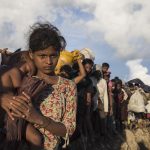This post originally appeared in the Asia Times
In its Cox’s Bazar refugee camps, Bangladesh has generously provided a modicum of safety and dignity to the Rohingya refugee survivors of the Myanmar military campaign of widespread and systematic violence in late 2017.
But the durability of that safety and dignity is now in doubt.
Last week, the Bangladeshi government announced that in November it will begin to relocate up to 100,000 of those more than 740,000 Rohingya refugees to Bhasan Char, a remote island in the Bay of Bengal. The Bangladeshi government’s motive for the planned relocation is to relieve desperate overcrowding in the Cox’s Bazar camps.
But the choice of Bhasan Char has raised serious concerns about the health and safety of Rohingya who relocate there.
Bhasan Char is prone to serious flooding and cyclones. Yanghee Lee, the United Nations Special Rapporteur on the situation of human rights in Myanmar, visited the island in January 2019 and returned expressing doubt about “whether the island is truly habitable.”
Lee warned the Bangladeshi government in March that a poorly-planned relocation to Bhasan Char, and without the consent of the refugees themselves, would “create a new crisis” for the Rohingya in Bangladesh.
The Bangladeshi government has insisted that all relocations to Bhasan Char will be strictly voluntary and that it has a list of 7,000 Rohingya refugees who have already agreed to move to the island. But it’s unclear whether those Rohingya are cognizant of the degree to which moving to Bhasan Char will worsen the already desperate isolation that refugee life has imposed on them.
Bhasan Char is hours by boat from the Bangladeshi mainland and sea conditions will effectively strand its residents for extended periods during the annual monsoon period. There are also questions about what access Rohingya refugees who relocate to Bhasan Char will have to health care and education.
Although the Bangladeshi government has upgraded infrastructure on the island to counter flood risks and built 1,440 buildings to house relocated Rohingya refugees, the island supports neither adequate agriculture nor commercial activity to sustain them.
The looming relocation to Bhasan Char is only the latest in a series of restrictive measures the Bangladeshi government has imposed on its Rohingya refugee population over the past two months. Those restrictions have been an official response to the August 25 mass protests by Rohingya refugees in the Cox’s Bazar camps, demanding accountability for the bloodshed of 2017.
The restrictions have included government directives to telecom service providers to cut services in the camps as well as efforts by Bangladeshi security forces to destroy SIM cards and confiscate the mobile phones of Rohingya refugees in the camps.
United Nations human rights experts have warned that “these restrictions have been applied in a discriminatory manner against members of the Rohingya minority, who are refugees in Bangladesh, but also that curfews and communications shutdowns could facilitate further serious human rights abuses against them.”
The Bangladeshi government has also announced plans to further physically isolate the Rohingya refugees in the Cox’s Bazar camps by enforcing an existing dusk-to-dawn curfew in the camps by ringing them with barbed-wire fencing and guard towers.
The Bangladeshi government has justified those measures as a response to criminal activity in the camps. But the increased Bangladeshi security presence in the camps have posed its own risks to the safety of the refugees who live there.
Earlier this month, Bangladeshi soldiers patrolling one of the camps allegedly forced their way into the home of a Rohingya refugee family and raped a 12-year-old Rohingya girl.
Bangladesh can and should do better by its Rohingya refugee population. But the plight of the Rohingya refugees in Bangladesh – which continues to shoulder significant subsistence and protection costs for their care – won’t significantly improve until Myanmar’s government guarantees a safe, dignified and voluntary repatriation of those refugees back to Myanmar.
However, the Myanmar government has adopted a strategy of craven denial of accountability for the crimes of 2017 and is refusing to guarantee citizenship for those Rohingya refugees, which makes repatriation unlikely anytime soon.
For the past two years, Myanmar’s government has denied its exhaustively documented culpability for those atrocities and stonewalled the international community. It has forbidden international organizations and observers, including UN Special Rapporteur Lee, from accessing Myanmar’s Rakhine state, where most of the Rohingya lived prior to bloodshed of late 2017.
The feasibility of repatriation is even more unlikely, given the dire risks that await the Rohingya back in Rakhine state. Earlier this week, the head of the United Nations Fact Finding Mission on Myanmar, Marzuki Darusman, warned of a “strong inference of continued genocidal intent on the part of the state in relation to the Rohingya and there is a serious risk of genocide recurring.”
What’s needed is international resolve to increase the pain point for Myanmar’s unwillingness to provide the accountability necessary to allow safe, dignified and voluntary Rohingya repatriation.
UN member states can contribute to that effort by filing a complaint against Myanmar to the International Court of Justice (ICJ) for Myanmar’s violation of the 1948 Convention on the Prevention and Punishment of the Crime of Genocide.
By doing so, UN member states can both spur the ICJ to investigate allegations of genocide and pursue reparations for Myanmar’s atrocities against the Rohingya as well as inspire other foreign governments to file their own ICJ complaints against Myanmar.
Foreign governments can and should also impose or tighten individual sanctions, including travel bans and asset freezes, against Myanmar government and military officials – and their family members – implicated in the 2017 violence.
Until individual states demonstrate the necessary political will to take such measures, accountability for the Rohingya will remain illusory and their safety and dignity in Bangladesh will continue to erode.

